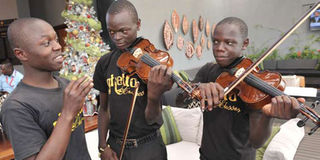How jazz music is changing the life of slum youngster

Joshua Keta (left) with some members of Ghetto Classics Team. PHOTO | COURTESY
What you need to know:
- On Saturdays before dawn, he is up with his younger brother scouring Eastlands neighbourhoods in search of construction jobs.
- It is his love for a genre of music that has found its way to Korogocho slum — the most unlikely of places — that he says has opened his life to a world of possibilities he never could have imagined.
- On some weekends, the multi-talented instrument player travels with the orchestra to perform at weddings or high-profile events like product launches.
The four sides of Joshua Keta could confuse anyone who hears his story for the first time.
During the week, the 19-year-old is a smartly dressed young man crisscrossing the well-manicured lawns of Strathmore University at Langata Road Campus where he is studying for a commerce degree.
On Saturdays before dawn, he is up with his younger brother scouring Eastlands neighbourhoods in search of construction jobs.
On Sunday, he is a mass server at St John’s Catholic Church, behind Dandora dumpsite.
But it is Keta’s fourth side that brings out the power in him.
It is his love for a genre of music that has found its way to Korogocho slum — the most unlikely of places — that he says has opened his life to a world of possibilities he never could have imagined.
Like most other low income settlements, hip hop and reggae are the most popular forms of music in Koch, as the area is popularly known, but Keta is a member of an orchestra.
He is a percussionist at Ghetto Classics, a group that has pulled at least 300 youngsters from the dangerous streets and corners of the slum to train them to play musical instruments.
The band is funded by proceeds from ticket sales of the annual Safaricom Jazz festival.
“A percussionist can play all kinds of drumsets like the tonga, cymbal, snare, glockspiel, timpani, xylophone and bass,” he says.
Popular in western countries and Nairobi’s high end restaurants or hotels in plush neighbourhoods, this form of music is largely an instrumental ensemble that contains string, brass, woodwind and percussion instruments.
It is Keta’s role in the band that has put him through high school and now helps support him in university. It also keeps him out of trouble unlike many of his agemates in the neighbourhood.
“Growing up in Korogocho is tough but the worst part is the stigma that comes with it,” he says. “Music has transformed me from an ordinary slum-dweller to one who can initiate and bring change to the society. It has made me earn dignity and respect.”
On some weekends, the multi-talented instrument player travels with the orchestra to perform at weddings or high-profile events like product launches.
But it has not always been easy for the second born in a family of five. He dropped out in Form One at Our Lady of Fatima High School because the principal could not put up with his father’s inability to pay fees.
His father is a security guard while the mother sells water from their home.
Keta’s earnings from casual work in the construction sites come in handy. He has been a labourer since he was 15 and says there are very few things in the construction business he does not know.
“After dropping out of high school, I went to my parish priest, Fr John Weboosta, to tell him my predicament and he directed me to Mrs Elizabeth Njoroge, the director of Ghetto Classics,” Keta says.
He has never looked back. Being a lover of jazz music and RnB made it easy for the then 14-year-old to fit in the band. Within a short time, he was a master in his own right. To put the icing on the cake, he was back in school as the band paid his form one and two fees in one instalment.
This form of music is picking up in the slum. Mrs Njoroge says residents didn’t understand it when the group was launched in 2009.
“Our objective is to use music education to provide the youth with opportunities that will improve their lives and the community. We do this by instilling in them life skills that come with the discipline of studying art music,” she says.
With 300 members, the group does weekly rehearsals at St John’s Catholic Church.
Safaricom has so far donated Sh12 million. Strathmore University is funding up to 90 per cent of Keta’s education after he scored a B+ in the Kenya Certificate of Secondary Education examination in 2013.
Proceeds from the jazz concerts, have been used to buy musical instruments and a van. According to Safaricom, the students learn to channel their energies into a more positive direction in life when they study music. “There is a kind of discipline you learn from the music as you just don’t start singing or rapping,” says Keta.





